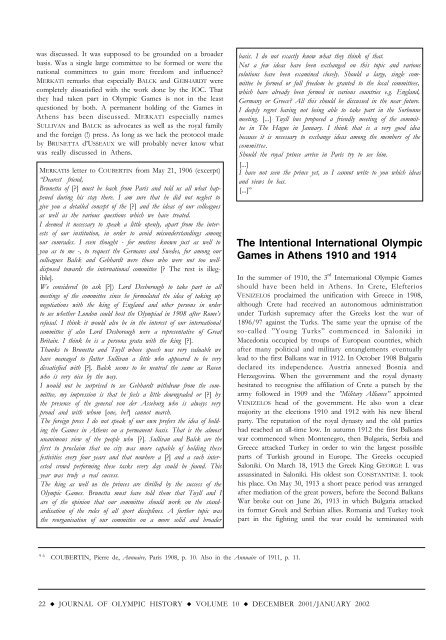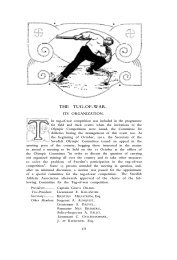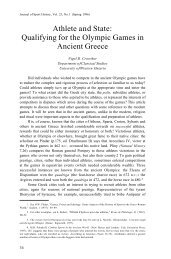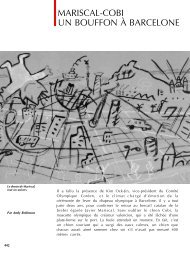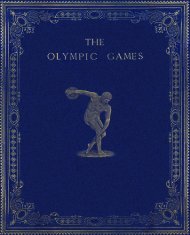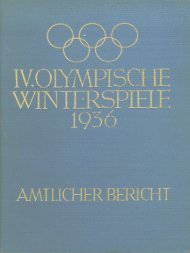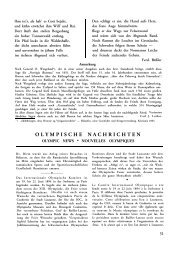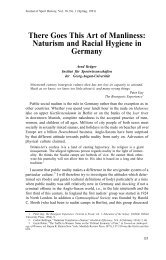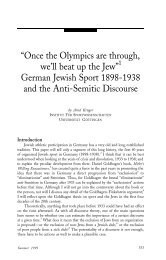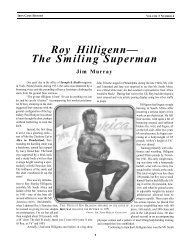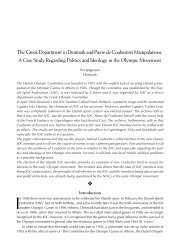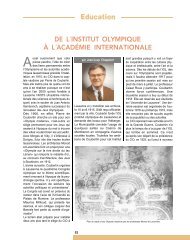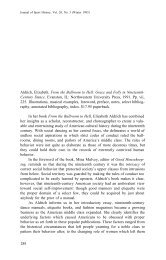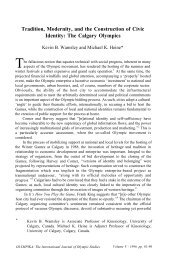The 2nd International Olympic Games in Athens 1906.
The 2nd International Olympic Games in Athens 1906.
The 2nd International Olympic Games in Athens 1906.
You also want an ePaper? Increase the reach of your titles
YUMPU automatically turns print PDFs into web optimized ePapers that Google loves.
was discussed. It was supposed to be grounded on a broader<br />
basis. Was a s<strong>in</strong>gle large committee to be formed or were the<br />
national committees to ga<strong>in</strong> more freedom and <strong>in</strong>fluence?<br />
MERKATI remarks that especially BALCK and GEBHARDT were<br />
completely dissatisfied with the work done by the IOC. That<br />
they had taken part <strong>in</strong> <strong>Olympic</strong> <strong>Games</strong> is not <strong>in</strong> the least<br />
questioned by both. A permanent hold<strong>in</strong>g of the <strong>Games</strong> <strong>in</strong><br />
<strong>Athens</strong> has been discussed. MERKATI especially names<br />
SULLIVAN and BALCK as advocates as well as the royal family<br />
and the foreign (!) press. As long as we lack the protocol made<br />
by BRUNETTA d’USSEAUX we will probably never know what<br />
was really discussed <strong>in</strong> <strong>Athens</strong>.<br />
MERKATIS letter to COUBERTIN from May 21, 1906 (excerpt)<br />
“Dearest friend,<br />
Brunetta of [?] must be back from Paris and told us all what happened<br />
dur<strong>in</strong>g his stay there. I am sure that he did not neglect to<br />
give you a detailed concept of the [?] and the ideas of our colleagues<br />
as well as the various questions which we have treated.<br />
I deemed it necessary to speak a little openly, apart from the <strong>in</strong>terests<br />
of our <strong>in</strong>stitution, <strong>in</strong> order to avoid misunderstand<strong>in</strong>gs among<br />
our comrades. I even thought - for motives known just as well to<br />
you as to me -, to request the Germans and Swedes, for among our<br />
colleagues Balck and Gebhardt were those who were not too welldisposed<br />
towards the <strong>in</strong>ternational committee [? <strong>The</strong> rest is illegible].<br />
We considered (to ask [?]) Lord Desborough to take part <strong>in</strong> all<br />
meet<strong>in</strong>gs of the committee s<strong>in</strong>ce he formulated the idea of tak<strong>in</strong>g up<br />
negotiations with the k<strong>in</strong>g of England and other persons <strong>in</strong> order<br />
to see whether London could host the Olympiad <strong>in</strong> 1908 after Rome’s<br />
refusal. I th<strong>in</strong>k it would also be <strong>in</strong> the <strong>in</strong>terest of our <strong>in</strong>ternational<br />
committee if also Lord Desborough were a representative of Great<br />
Brita<strong>in</strong>. I th<strong>in</strong>k he is a persona grata with the k<strong>in</strong>g [?].<br />
Thanks to Brunetta and Tuyll whose speech was very valuable we<br />
have managed to flatter Sullivan a little who appeared to be very<br />
dissatisfied with [?]. Balck seems to be neutral the same as Rosen<br />
who is very nice by the way.<br />
I would not be surprised to see Gebhardt withdraw from the committee,<br />
my impression is that he feels a little downgraded or [?] by<br />
the presence of the general von der Asseburg who is always very<br />
proud and with whom [one, be?] cannot march.<br />
<strong>The</strong> foreign press I do not speak of our own prefers the idea of hold<strong>in</strong>g<br />
the <strong>Games</strong> <strong>in</strong> <strong>Athens</strong> on a permanent basis. That is the almost<br />
unanimous view of the people who [?]. Sullivan and Balck are the<br />
first to proclaim that no city was more capable of hold<strong>in</strong>g these<br />
festivities every four years and that nowhere a [?] and a such <strong>in</strong>terested<br />
crowd perform<strong>in</strong>g these tasks every day could be found. This<br />
year was truly a real success.<br />
<strong>The</strong> k<strong>in</strong>g as well as the pr<strong>in</strong>ces are thrilled by the success of the<br />
<strong>Olympic</strong> <strong>Games</strong>. Brunetta must have told them that Tuyll and I<br />
are of the op<strong>in</strong>ion that our committee should work on the standardisation<br />
of the rules of all sport discipl<strong>in</strong>es. A further topic was<br />
the reorganisation of our committee on a more solid and broader<br />
basis. I do not exactly know what they th<strong>in</strong>k of that.<br />
Not a few ideas have been exchanged on this topic and various<br />
solutions have been exam<strong>in</strong>ed closely. Should a large, s<strong>in</strong>gle committee<br />
be formed or full freedom be granted to the local committees,<br />
which have already been formed <strong>in</strong> various countries e.g. England,<br />
Germany or Greece? All this should be discussed <strong>in</strong> the near future.<br />
I deeply regret hav<strong>in</strong>g not be<strong>in</strong>g able to take part <strong>in</strong> the Sorbonne<br />
meet<strong>in</strong>g. [...] Tuyll bus proposed a friendly meet<strong>in</strong>g of the committee<br />
<strong>in</strong> <strong>The</strong> Hague <strong>in</strong> January. I th<strong>in</strong>k that is a very good idea<br />
because it is necessary to exchange ideas among the members of the<br />
committee.<br />
Should the royal pr<strong>in</strong>ce arrive <strong>in</strong> Paris try to see him.<br />
[...]<br />
I have not seen the pr<strong>in</strong>ce yet, so I cannot write to you which ideas<br />
and views he has.<br />
[...]”<br />
<strong>The</strong> Intentional <strong>International</strong> <strong>Olympic</strong><br />
<strong>Games</strong> <strong>in</strong> <strong>Athens</strong> 1910 and 1914<br />
In the summer of 1910, the 3 rd <strong>International</strong> <strong>Olympic</strong> <strong>Games</strong><br />
should have been held <strong>in</strong> <strong>Athens</strong>. In Crete, Elefterios<br />
VENIZELOS proclaimed the unification with Greece <strong>in</strong> 1908,<br />
although Crete had received an autonomous adm<strong>in</strong>istration<br />
under Turkish supremacy after the Greeks lost the war of<br />
1896/97 aga<strong>in</strong>st the Turks. <strong>The</strong> same year the upraise of the<br />
so-called ”Young Turks” commenced <strong>in</strong> Saloniki <strong>in</strong><br />
Macedonia occupied by troups of European countries, which<br />
after many political and military entanglements eventually<br />
lead to the first Balkans war <strong>in</strong> 1912. In October 1908 Bulgaria<br />
declared its <strong>in</strong>dependence. Austria annexed Bosnia and<br />
Herzegov<strong>in</strong>a. When the government and the royal dynasty<br />
hesitated to recognise the affiliation of Crete a putsch by the<br />
army followed <strong>in</strong> 1909 and the ”Military Alliance” appo<strong>in</strong>ted<br />
VENIZELOS head of the government. He also won a clear<br />
majority at the elections 1910 and 1912 with his new liberal<br />
party. <strong>The</strong> reputation of the royal dynasty and the old parties<br />
had reached an all-time low. In autumn 1912 the first Balkans<br />
war commenced when Montenegro, then Bulgaria, Serbia and<br />
Greece attacked Turkey <strong>in</strong> order to w<strong>in</strong> the largest possible<br />
parts of Turkish ground <strong>in</strong> Europe. <strong>The</strong> Greeks occupied<br />
Saloniki. On March 18, 1913 the Greek K<strong>in</strong>g GEORGE I. was<br />
assass<strong>in</strong>ated <strong>in</strong> Saloniki. His oldest son CONSTANTINE I. took<br />
his place. On May 30, 1913 a short peace period was arranged<br />
after mediation of the great powers, before the Second Balkans<br />
War broke out on June 26, 1913 <strong>in</strong> which Bulgaria attacked<br />
its former Greek and Serbian allies. Romania and Turkey took<br />
part <strong>in</strong> the fight<strong>in</strong>g until the war could be term<strong>in</strong>ated with<br />
96<br />
COUBERTIN, Pierre de, Annuaire, Paris 1908, p. 10. Also <strong>in</strong> the Annuaire of 1911, p. 11.<br />
22 ◆ JOURNAL OF OLYMPIC HISTORY ◆ VOLUME 10 ◆ DECEMBER 2001/JANUARY 2002


